For “Underground” actor Alano Miller, the words “slave drama” nearly put him off from the project completely.
“You know, when it was first pitched to me, I kinda was like uh, I don’t think I want to do this,” Miller recalls. “Then I read the script and I was blown away.”
His early reservations, understandable, for any Black actor. To relive America’s first original sin is a daunting task in itself, but to do so portrayed as the perception of “self-hate” – a slave driver? Challenging.
“It was definitely a scary place to go because when you first see Cato on paper, you’re judging him,” says Miller, of his character. “For me, as the artist, I judged him right off the bat. I asked myself how I was going to bring this type of character to life and define the hero in him?”
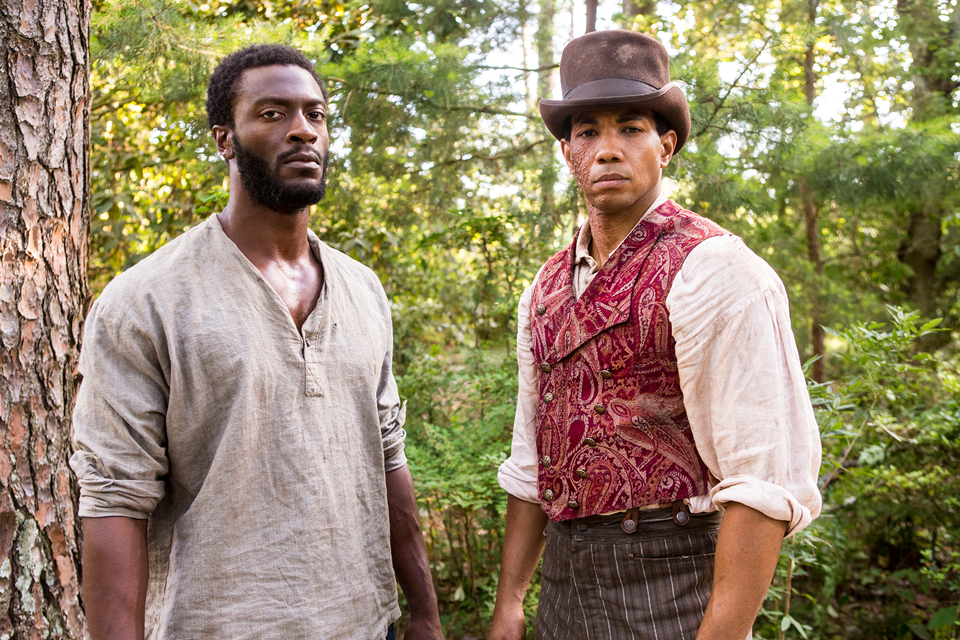
“This is breaking out of the system, this is taking back our freedom, our worth, our ownership and moving forward to freedom.”
WGN Television’s new series, inspired by the Underground Railroad and executively produced by John Legend, very much wrestles with the images of the first heroes of America’s time. Shades of gray defined their actions and as far as characters go, Cato perhaps best characterizes this. He’s the deepest shade of shade of gray, a self-serving product of his surroundings.
It would take a certain level of confidence to embrace this protagonist, a quality that seems to pour out of Alano Miller just through his words. When he speaks, you hear conviction. Whether it’s due to his award-winning public speaking background or extensive experience within the arts, it’s clear that Miller’s thoughts, opinions and background are as varied as the show he’s been tasked to star in.
SO WHAT CAN YOU TELL ME ABOUT HOW “UNDERGROUND” IS APPROACHING THIS SINGLE STORY UNDERGROUND RAILROAD NARRATIVE? As far as a displayed narrative, this definitely deals with revolution and the celebration of a people. It’s not about the occupation as my creator would say, which is completely different. It doesn’t go with the place of being victims. At times we watch these and we see being victims and not being able to break out of the system that they were put in and forced in and this is not that at all. This is breaking out of the system, this is taking back our freedom, our worth, our ownership and moving forward to freedom. It’s also about what legacy you’re leaving your children, your future. I think that’s what in all of this through the characters, at least in the first season, that’s where we’re going.
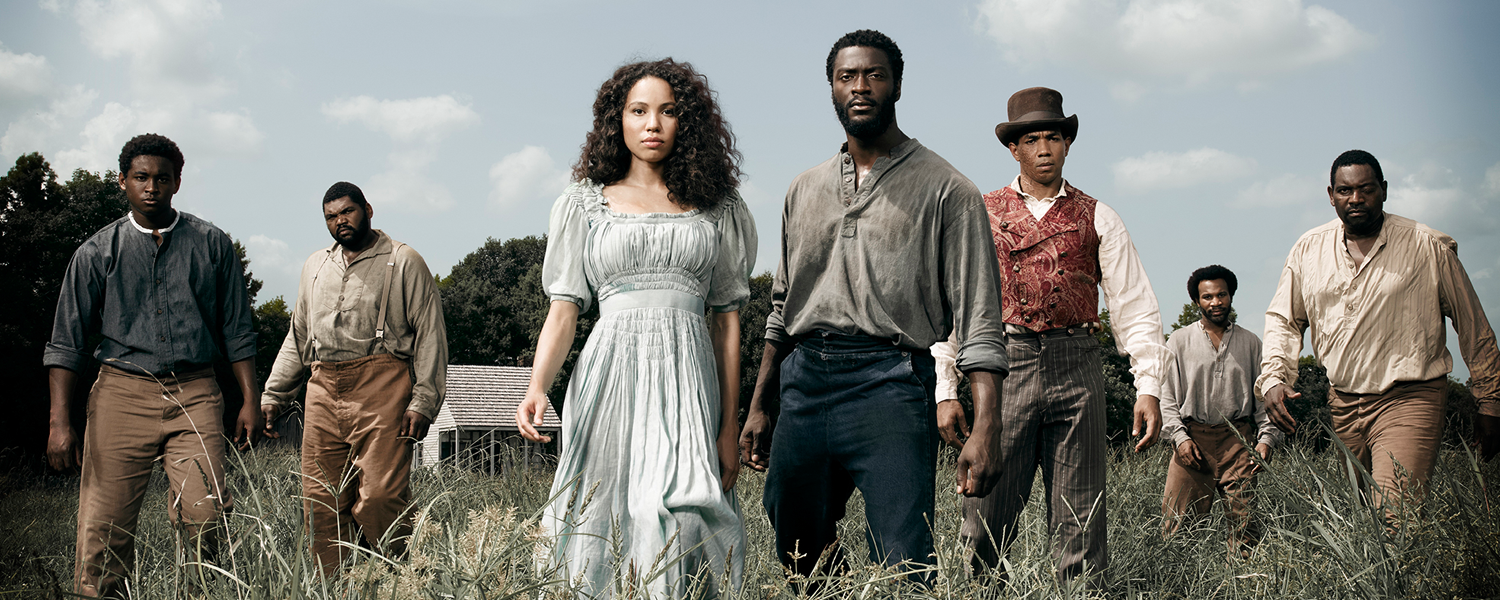
YEAH BECAUSE YOU GUYS SEEM TO BE REALLY BREAKING GROUND IN THE SENSE THAT THERE HAVE BEEN VERY FEW TELEVISION SERIES THAT DIRECTLY DEALT WITH SLAVERY-RELATED TOPICS. GIVE ME A SENSE OF WHAT IT FEELS LIKE TO BE A PART OF THIS PROJECT. You know, when it was first pitched to me, I kinda was like, ‘uh, I don’t think I want to do this.’ They called it, at the time, a ‘slave drama’ and then I read the script and I was blown away. I was blown away more by the fact that they were fleshed-out characters. They were tri-dimensional. It wasn’t like, this is the villain, this is the hero. Everyone is flawed across the board and that for me was so exciting to show so many different perspectives. Not to just say that this is a story where the White man is the terrible human being and the Black man is perfect and we’re going to unite in our freedom. It wasn’t that, it was so convoluted and so dangerous and exciting and the fact that creator Misha Green threw in the music in such a way, starting off with [“Black Skinhead”] from Kanye West for instance. They wanted to push the music so boldly so that it wasn’t a show that was stuck in a museum. Making it relevant right now, using that music would bring it to now even though it was set in 1857. We don’t get to celebrate enough. The response I keep hearing before they see anything is ‘ugh, another slave story,’ and I’m saying, why are we afraid to tell these stories? Why shouldn’t we be telling these stories and why shouldn’t we look at them as superheroes? They are the first heroes of our kind before there were Superman and Batman. These were our first superheroes and what they did and how they did it. The genius of them to do what they did and the boldness and the bravery. I think that to me instills a different type of worth and meaning as an artist and as a human being to know where I come from.
YOU MENTION SOME OF THEM WERE FLAWED CHARACTERS. HERE YOU ARE, A BLACK MAN, PLAYING A CHARACTER IN THIS KIND OF SETTING, BUT AS AN OVERSEER OF ALL PEOPLE. WHAT DID YOU HAVE TO DO MENTALLY TO PREPARE FOR THIS ROLE? What I found was that Cato is a character who is a product of the society he lives in. He’s doing whatever it takes to survive. So that’s how it was in the beginning, it was a process for me to say, ‘okay, I can look at him from a different angle and not judge this character for just being one thing.’ People will find out so many things about him. His fears, his love, his hatred, his anger, his past, how he got the scar and all of that. I realized that he deserves – like every character as we judge as being terrible, a traitor or worthless – to be redeemed and given a chance. So many people in our current time have gone to prison, they deserve second chances, possibilities and deserve to have worth.
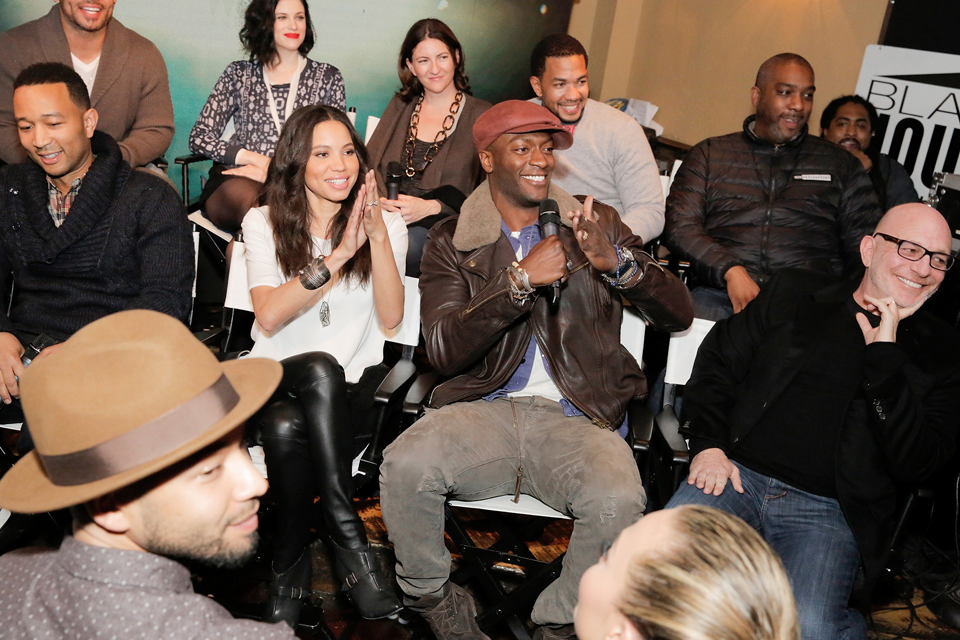
“It’s not that he just makes music, it’s that [John Legend] walks the walk … He kept us invigorated to keep going and keep believing that we have something special on our hands.”
SO THROUGH ALL THIS, TELL ME ABOUT THE TEAM DYNAMICS ON SET. The first time we met, we met at a restaurant and we sat across from each other and right away we all clicked. It was crazy. It doesn’t always happen like that, but we became a family instantly and there was no alienation. The moment we had a chance to sit together, it became a safe haven for us, for us to fail, for us to succeed, to be vulnerable and that’s what we needed to tell this story. I think the reason why it becomes so much stronger is because of the trust that we all had for each other. There’s a scene where Jurnee Smollett-Bell (“Full House”, The Great Debaters), is being whipped in the arm and it’s that moment when the scene is cut, she can be embraced by our cast, by the creators and by our director and our crew. That is the type of safe place that we created on the set. We wanted there to be conversations, questions and collaboration – some type of hope, love and feeling on our set because we needed it. We’re performing in real slave quarters and we’re in a real plantation, so it was already filled with so much spirit. It already had our ancestors there. So to already come in and be telling this story that is uncomfortable for many to watch, as artists we needed people to know that we had each other’s backs and that the producers had our backs, including John Legend. So that we can feel that we can tell the story with the gravitas and the love, excitement, adventure, all of it … We still call each other every day. We still text each other in our group messages, we still see each other all the time. For me, that’s a friendship, that’s a bond, that’s a family and that is amazing. If the show didn’t even get picked up and doesn’t get a second season, that in itself was worth doing [it].
NOW PEOPLE NATURALLY KNOW JOHN LEGEND FOR HIS MUSIC, NOT NECESSARILY FOR HIS FILM [AND TV] CREDITS. WHAT SORT OF IMPACT HAS HIS NAME AND RESOURCES DONE FOR THE PRODUCTION OF “UNDERGROUND”? For him to put his name on something is a big deal in general. Just coming to all the interviews, to be sitting in the editing room and just sitting with everyone. And his attachment to the project itself I think is what attracted others to add resources to the show. You had The Weeknd at the end of the show as far as musically, Josiah Bell who is Jurnee Smollet Bell’s husband, he’s also being featured in it. You also have Kanye, there’s rock and country music. That’s the kind of thing that he really fought hard to make sure that this show was bold musically and also from a story standpoint, that it stands alone. That it’s an aid and not something that washes out the story, because sometimes music can do that, he doesn’t do that. For me, when I see him, he’s always leaning forward trying to figure out what the next step is, and he’s just been so voracious in making sure that this is the most highly anticipated show of this year. Yes, it’s going to be successful, but I think his hand on it was the right fit. It’s just his spirit, energy and heart, all of those things, and just what he does. It’s Selma, but it’s also incarceration, how he feels about incarceration … It’s not that he just makes music, it’s that he walks the walk and you need people attached to this that have that type of movement. We’re not just saying it; we’re taking it to the streets. He kept us invigorated to keep going and keep believing that we have something special on our hands.
APART FROM THIS TELEVISION SERIES, YOUR STAT LINE [ASIDE] FROM ACTING IS PRETTY IMPRESSIVE. YOU GOT A KEY TO THE CITY IN ORLANDO AND YOU ALSO HAD A HAND IN PUBLIC SPEAKING. YOU COULD HAVE BEEN MANY THINGS. WHAT IS IT ABOUT ACTING THAT SPECIFICALLY ATTRACTED YOU? My mother used to tell me all the time that she was an actress at one point in her life and as a kid I just constantly found myself doing plays or doing something that had to do with some form of performance art. At one point you’re in high school you’re trying, well you’re most likely terrible (laughs), but you’re trying to find your group that you connect with. I was in [the] band, I played basketball, played football and public speaking. I was doing all this stuff, and just finding my place of refuge. Theatre was that place for me. There was something about being able to just disappear from some things. The excitement of just watching it, creating it, all that was already in me, but it was brought out more through theatre and performance art. Then I realized that I wanted to be educated in it. I didn’t want to just think I could wake up and just do this. So I went to undergrad, then I went to grad for it. It was in undergrad that I did this play, which was considered a farce, after it I played this Spanish general, had my hair parted and it’s huge, a wild crazy, fun character. Afterwards this young lady walks up to me, who I didn’t even know, and she told me that she hadn’t laughed like that in a long time and that she had been dealing with depression and at one point was considering to commit suicide. That actually is what changed my whole course of thinking and how important it was for me to do this. It took away the fame, fortune and all that kind of stuff that you think of. It took it away and brought it down to another level. It’s that thing of being able to hold a mirror to people. Yes, it’s also that ability to entertain and make people laugh and forget their worries, but also build their worries. It’s about sharpening each other. It’s all those things that for me, in that moment helped me understand that what I was doing was less about me and more about them.
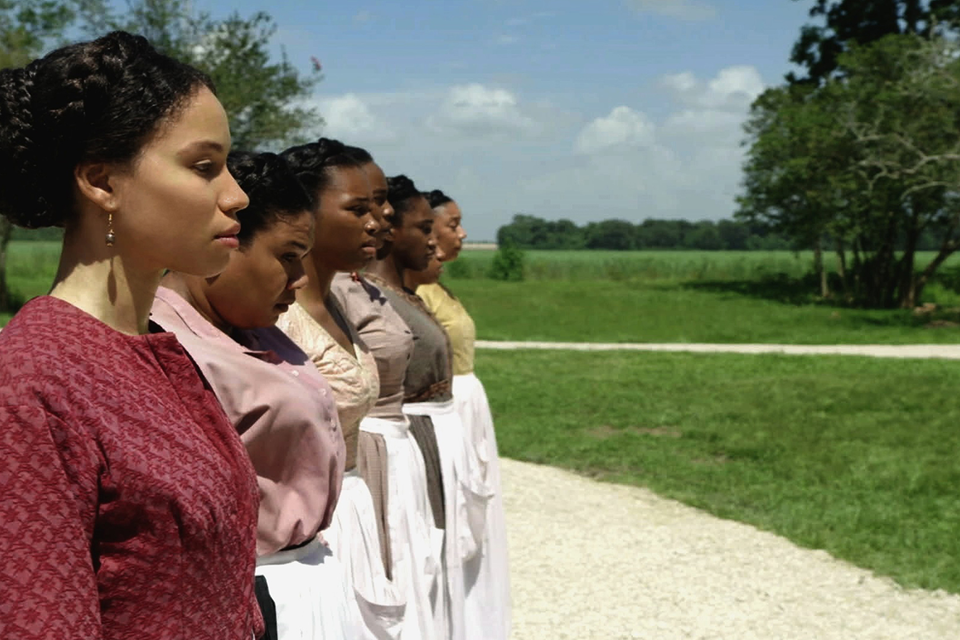
“I don’t want us to forget that we’re still fighting for this inequality.”
THIS IS NATURALLY A QUESTION I WANT TO ASK, GIVEN WHAT THE STATE OF THE CONVERSATION HAS BEEN OVER THE LAST FEW MONTHS AS FAR AS #OSCARSSOWHITE AND THE WHOLE LACK OF DIVERSE INCLUSION IN HOLLYWOOD. WHAT’S YOUR TAKE ON IT FROM A BLACK ACTOR’S PERSPECTIVE? Well I have two points. On one side I feel like, of course you want things to change, you want there to be more opportunities across the board. But the changes are not going to come by us just boycotting. It’s going to start in the studios, it’s going to start in the network rooms, with the writers, directors and when people start seeing people as human beings. We also have to cultivate new voices, we have to in order to bring up fresh faces and give people exposure that they normally would not have. We’ve got to take chances and if you aren’t doing that then why are we really doing this? If it’s just going to be a circle of the same people, we’re really not moving forward and you’re not helping us tell stories better by keeping it in the same circles. On the other side I also fear that we will get so caught up in this movement that we will forget about other movements that are, in my opinion, more important. Flint, Michigan is a big deal, police brutality is crazy, the injustice with incarceration, we deal with education, we’re dealing with all these issues. For me, I don’t want those things to be swept under the rug. I don’t want us to forget that we’re still fighting for this inequality that’s going on and that the award, though beautiful when minorities are recognized, to me at this point, doesn’t hold the same worth as legacy than it could if we were to put our energy behind some of these other issues that are going on in our society. That for me is my activist part speaking. I don’t want us to forget those things, we have to keep holding those issues up to the light because if we drop them, people will literally forget and that is America across the board. That isn’t a Black thing, a White thing, that’s just America. We forget things very quickly because there’s a lot of distractions out there. Those are the issues that I go after and if I get noticed for an award, awesome. But if I don’t, I still believe I’ll be okay (laughs).
YOU’VE TAKEN ON MANY ROLES, BUT THIS IS SOMETHING DIRECTLY FROM HISTORY AND RELATES SOMEWHAT TO YOU AND THE BLACK EXPERIENCE. WHAT ARE YOU TAKING AWAY FROM THIS? It has been more grounding for me – how bold and courageous these men and women were. For me I think I took away that, wanting to be bolder, courageous, brave in today’s time. Standing for something instead of falling for anything. We were physically doing all these things, but I wasn’t there. We were acting, we went back to our air conditioned trailers, to our bed and they did not. For them to keep maintaining that … even the fact that they lent a hand to strangers, I mean this was the first real civil rights movement and you’re lending your hand to strangers and you’re trying to aid them to safety. All that stuff is about compassion and about heart. For me, that type of mindset that they had, that’s what I hope I’ve taken away. That type of selflessness. That for me, I think at the end of the day, is what I hope can transition into my life. That I will be able to pass down and pass on that type of hope.

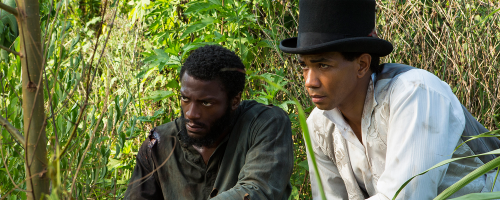


Comments are closed.